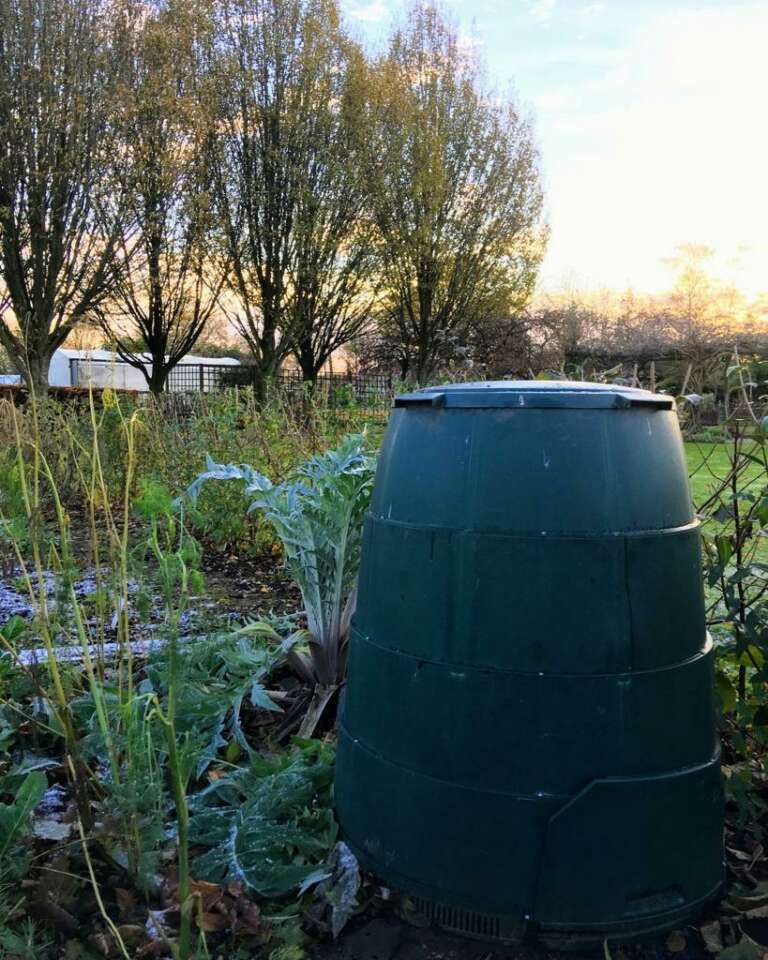Winter composting tips

Don't let the cold weather put you off composting, says our senior project coordinator for Cumbria Master Composters. Composting can warm you up, and help you recycle winter waste.
When the nights get longer than the days, and the winter chill sets in, the composting process will naturally slow down - or even stop if the weather is extremely cold.
Sitting dormant like this, the soil life - including your trusty compost worms - will retreat from the edges and find the warmest pockets to huddle together and overwinter.
It’s easy to forget and switch off from home composting, but if you keep composting during the winter months, you will be rewarded in the spring!
1. Keep adding material to your compost
You can still add plenty of nitrogen-rich veg peelings from winter stews and soups and this will keep the process going to some extent. Don't forget to balance with 'browns' or you will find your compost will turn into a slimy mess as soon as the temperatures warm up. If you have stockpiled dead plant material when cutting back in the autumn, now is the time to use some of this carbon rich material that there can be a shortage of at this time of year, although cardboard and scrunched up paper will also do the trick.
Activators such as bokashi (or urine) can give your compost a boost in the winter when other activators such as nettles and comfrey are in short supply. If you're able to move your compost bin to a sunny but sheltered spot during the winter months, this will keep the ambient temperature that bit warmer to keep the composting process ticking over.
2. Consider insulating your compost heap
If you’re hot composting or using compost bins such as the HotBin, which is already insulated, you can keep composting all year round. Chop items up and keep the balance of wet and dry materials to help keep a constant temperature.
You can make your own insulated system from recycled or reclaimed materials, or check out if there is a custom insulation jacket for your type of compost bin. Just a thick layer of carbon rich material on top of your decomposing waste will provide some insulation and covering your bin with a lid or a piece of old woollen carpet and/or a tarp will keep the moisture and heat in and also stop it from getting too wet when the rain returns.
It's good practice to cover your compost heap, whatever the weather, to keep the warmth and moisture in. This stops it getting too wet from the rain or drying out from the sun and wind.
3. Should you turn your compost during the winter?
Turning your compost heap, or aerating your bin during the winter months, will certainly keep things going and speed up the composting process.
But it's sensible to choose only mild weather spells to do this. Exposing the warmest part of your compost to very cold temperatures will let too much heat out. Also, when the weather is particularly cold the important compost creatures will migrate to the warmer centre of the heap to keep warm - so it’s best to leave them in their cosy corner until the weather is better.
4. Warm up your worms
Worms prefer a constant temperature inside their home, working best at 12-25°C. Much colder than this and they will slow down, and too hot and they will become fatigued or even overheat.
If you have a wormery and are leaving it outside, make sure you insulate it very well and keep an eye on it in very cold spells. Compost bins that have contact with the ground allow the worms and other compost creatures to migrate to a warmer spot when it's too cold. But because worms in a wormery are contained and generally smaller, they will need to be protected during really cold spells.
Alternatively, you could move it to a more protected place like a greenhouse, shed, garage or cellar. Also, make sure you take it out of a shed or greenhouse before the temperatures get too warm again next year as worms don't like getting too hot either. You will find that, if temperatures are lower, wherever you site your wormery for winter, things will slow down, and the worms will not process the food waste quite as quickly as at warmer times of the year.